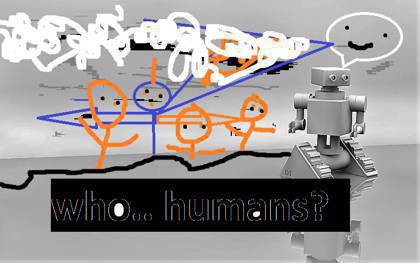

 Dr Deepak Kumar Pandey
Dr Deepak Kumar Pandey

Artificial intelligence(AI), machine learning, deep learning, robots and smart drones are changing the way we humans think, behave and work. This change is very fast and unavoidable. Some humans may visualise it as necessary evil. You like it or not it is going to change everything. It is better to identify this process and be prepared for its future. Two prominent question arise in this process:-
i. How we visualise coexistence of AI, Humanoid Robots, and Humans?
ii- What will be the future of society?
As technology continues to advance, we are seeing an increasing integration of AI, humanoid robots, and humans in various industries and settings. From healthcare to transportation to manufacturing, these technologies are changing the way that we work, interact, and live. While the integration of AI and robots may bring many benefits, there are also important social and ethical questions that need to be addressed as we move towards a future where these technologies coexist with humans.
One of the key areas where the coexistence of AI, humanoid robots, and humans will have an impact is in the field of sociology. As automation and AI continue to replace certain tasks and jobs, there may be changes in the way that humans interact with each other in the workplace.
For example, the automation of certain tasks may lead to changes in the division of labour and the way that different groups of people are valued or compensated for their work. This could lead to new forms of inequality and social stratification, as some groups are displaced or devalued in the new automated economy.
This will lead to classification of robots, humanoids and humans to many specialised groups based on their works. This system will be based on merit , intelligence, richness of information and skills.
This system will be very similar to 'jati' and 'varna' system of sanatana dharma of pre colonial India (Bharat Varsha).This classification ,after very long time, will gradually lead to stratification.
There may also be changes in the way that humans form relationships and social bonds with machines. Robots will start replacing need of relatives and friends in case of emergencies and emotional need.
It will be an interesting to see the future of development of emotions in robots and other racial beings (ORB) which may emerge in future. Relations between humans and humanoids will also see new dimensions of emotions.
Data driven decisions and ability to think rational will always be important limiting factors in development of emotions in robots, humanoids and other racial beings(ORB).
Humans will always remain more emotional in comparison of humanoids or other racial beings(ORB).
As humanoid robots become more advanced and integrated into healthcare or eldercare settings, for example, humans may form social bonds with these machines.
This raises interesting questions about the nature of social cognition and the way that humans perceive and interact with others.
Another area of social science that will be impacted by the coexistence of AI, humanoid robots, and humans is psychology. As humans become more accustomed to interacting with machines, there may be changes in the way that we form relationships and social bonds with others.
This could lead to new understandings of social cognition and the way that humans perceive and interact with others.
There may also be changes in the way that humans perceive and trust machines, which could have implications for the development and implementation of AI technologies in various settings. It will certainly change the relationship between men and women in humans.
The institution of marriage will see new entrants such as humanoids and ORB. Humans may fall in love with them and will start marrying them. The institution of marriage will never collapse as it is based on love. As long humans will exist, love and emotional drama will also exist.
In addition to sociology and psychology, ethics is also a crucial area of social science that will be impacted by the coexistence of AI, humanoid robots, and humans.
As we develop more advanced AI and robots, there will be important ethical questions to consider about the impact of these technologies on human welfare and the rights and dignity of machines.
For example, there may be concerns about the potential for AI to replace human decision-making in certain areas, such as healthcare or criminal justice, and the potential for bias or discrimination in the algorithms used by these systems.
There may also be questions about the potential for humanoid robots to replace or supplement human caregivers, and the ethical implications of this for human dignity and social welfare.
Ultimately, the coexistence of AI, humanoid robots, and humans will have a significant impact on society in a variety of ways. As we move towards this future, it is important that we continue to study and explore the complex social and ethical implications of these technologies.
Right now, a conscious effort should be launched to ensure that ethics of the new social system are developed and implemented in ways that benefit society as a whole.
We must ensure to involve diverse stakeholders in these discussions, including experts in social science, engineering, and ethics, as well as members of affected communities and groups. Presently, it is not possible to involve AI models, robots and humanoids in this process of evolution of new ethics.
However, in future we will have to include them in this process also. In future, any ethical system made without their involvements will be challenged by them.
Some key terms which will witness changes in future are: sociology, psychology, ethics, social cognition, human-robot interaction, machine ethics, bias, discrimination, social welfare, and human dignity associated with the issue of AI, robotics, automation.
By continuing to explore and understand the implications of the coexistence of AI, humanoid robots, and humans, we can help ensure a better future for all.
#Sociology #AI #humanoids #humans #ethics #futureofhuman #machineethics